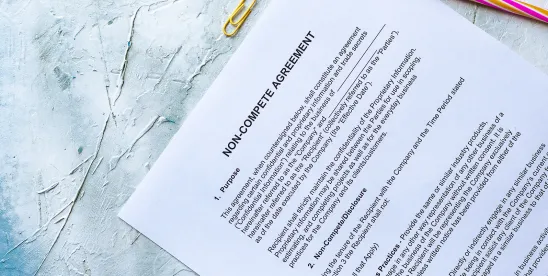Earlier today (July 23, 2024), Judge Hodge in the U.S. District Court for the Eastern District of Pennsylvania denied a tree care company’s motion to stay the effective date and preliminarily enjoin the Federal Trade Commission’s (“FTC”) proposed final rule (“Final Rule”) banning nearly all non-competes. ATS Tree Services, LLC v. Federal Trade Commission, No. 2:24-cv-01743-KBH (E.D. Pa.). The decision comes in the wake of the U.S. District Court for the Northern District of Texas’ July 3, 2024 ruling to the contrary in Ryan LLC v. Federal Trade Commission, No. 3:24-cv-00986-E, which stayed the Final Rule’s effective date as to the plaintiffs in that case, but had no nationwide effect.
The Pennsylvania Court’s Decision
The Pennsylvania court denied Plaintiff ATS Tree Services, LLC’s (“ATS”) request for a preliminary injunction based on its conclusion that the company failed to establish that it (i) would suffer irreparable harm if injunctive relief was not issued; and had a reasonable likelihood of succeeding on the merits of its claims.
ATS argued it would be harmed by incurring “nonrecoverable efforts to comply” with the Rule, and by losing “the contractual benefits from its existing non-compete agreements.” ATS described its nonrecoverable compliance costs as: costs associated with notifying its twelve employees of the change in accordance with the Rule’s notice provision; the costs and efforts to “review and modify [its] business strategy”; and the unquantifiable costs and efforts of altering its specialized training program. But court found these either insufficient or too speculative to support injunctive relief. ATS further argued it would face the risk that its employees would leave and transfer confidential information to direct competitors. The court found these risks too speculative.
ATS also unsuccessfully argued that it would succeed on the merits because, it asserted, the FTC lacks substantive rulemaking authority under its enabling statute, the FTC exceeded its authority, and Congress unconstitutionally delegated legislative power to the FTC. The court rejected each argument. The court further found that the “major questions doctrine” did not apply, because the Final Rule falls within the FTC’s core mandate, and the FTC has previously used its Section 6(g) rulemaking power in similar ways to the Final Rule.
Looking Forward
The Pennsylvania court’s decision did not analyze the Ryan decision, which reached contrary conclusions. It is likely that the dispute will ascend to the Third and Fifth Circuits, respectively. Notably, the Ryan court has indicated that it intends to issue a final judgment on the merits by August 30, 2024, which is likely to be appealed, and the Final Rule is scheduled to become effective by September 4, 2024.







 />i
/>i

